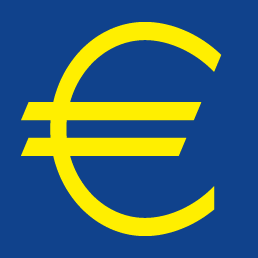 FREQUENTLY
ASKED QUESTIONS
FREQUENTLY
ASKED QUESTIONS 
Main Page |
|
Greek economy and Euro |
|
Banknotes |
|
| Euro Coins |
|
| FAQS |
|
| LINKS |
|
 |
Frequently Asked Questions
What is Euro?
The euro is the single currency adopted by 12 European countries, the euro-zone countries, including Greece,
which joined the family of euro economies on 1 January 2001.
Which are the euro-zone countries?
Italy, France, Germany, Holland, Finland, Luxembourg, Belgium, Spain, Portugal, Austria and Ireland adopted the euro as their
common currency as of 1 January 1999. These countries constitute the Economic and Monetary Union (EMU) member states.
At present, the UK, Denmark and Sweden have not joined EMU. On 19 June 2000, Greece became the twelfth
euro-zone member state.
How are prices converted to euro?
All prices in drachmas are now converted to euro at the rate of 1 euro = 340.75 drachmas set on 29 December 2000. Rounding of
amounts, where required, is carried out in line with the official EU rounding regulation.
For example, the price of an article costing GRD10,000 shall be EUR29.35.
How will banking transactions be affected?
For the period 1 January 2001 to 31 December 2001 deposit accounts, loans and credit cards will be denominated
in both currencies, i.e. in drachmas and in euro. During the same period, all EMU currency conversions will
be made on the basis of the euro. For example, in order to convert drachmas into Deutsche Mark, the drachmas must be first converted
to euro and then the euro to Deutsche Mark, at the irrevocably fixed conversion rate.
Irrevocable conversion rates of the national currencies of the 11 euro-zone countries were set on 31 December 1998.On 29 December 2000, the drachma/euro conversion rate was also fixed irrevocably, at 340.75 drachmas = 1 euro.
As of 1 January 2002, all bank accounts in drachmas, as well as accounts in euro-zone currencies,
will be automatically converted to euro by the banks at no cost to depositors.
How does the euro affect businesses?
As of 1 January 2001, businesses are required to express all transactions with consumers in both drachma and euro.
This applies to invoices, receipts, copies of bills, purchase and discount vouchers, pricelists and quotes, and all advertising stating
What are the advantages of the euro?
The euro will bring considerable benefits to consumers and businesses operating in EU member states.
Some of these benefits are listed below:
· Funds can be transferred cheaply and easily within the single European market. Competition is enhanced,
which means lower prices for the consumer.
· Increased trade and economic growth will help create new jobs.
· Lending rates are lower, thus fostering a stable business environment, higher consumer demand and economic growth all round.
· Consumer purchasing power is stable, as there is no longer the risk of local currency depreciation.
· Inflation is kept at low levels, meaning that consumers’ purchasing power is stable.
· Price stability is ensured thanks to the removal of exchange rate risk in the case of goods originating from elsewhere in the euro zone.
· Travel within the euro-zone countries is now less expensive, since all the countries use the same currency.
This page Transcribed by Ioannis Zacharopoulos
Last updated 20/10/2007
Copyright © Trademarks belong to their companies and organisations that have them registered.